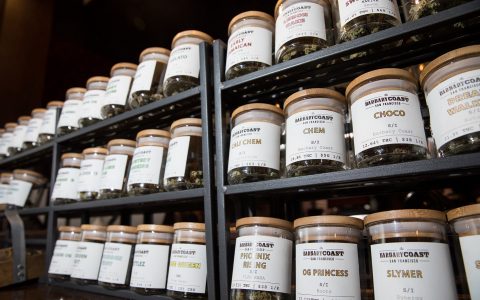Oregon’s Legislature made history this week by passing the nation’s first cannabis export bill, a measure designed to allow Oregon to send cannabis products across state lines. Senate Bill 582 now goes to the governor’s office, where Gov. Kate Brown is expected to sign it.
Oregon Sen. Floyd Prozanski, bill sponsor
The measure would authorize Oregon’s governor to enter into agreements with other states for purposes of exporting and importing cannabis. Such transactions would need to meet certain restrictions, for example the receiving state would need to border Oregon, and the cannabis would have to meet the legal and quality standards of the receiving state.
“This is a very strong statement by the Oregon Legislature, and one that will reverberate across the country,” the bill’s sponsor, state Sen. Floyd Prozanski, said in statement to Leafly. “The future of this industry is that cannabis will primarily be grown where it grows best, and most efficiently, and most sustainably. That’s what functioning legal markets do.”
If the bill becomes law, as expected, what happens next? Oregon’s cannabis industry is sitting on a massive surplus of excess cannabis flower: over a million pounds of it, with more piling up every day. How long will it be before consumers in other states can legally purchase some of the state’s surplus?
One Piece of the Puzzle
Senate Bill 582 wouldn’t automatically legalize cannabis exports from Oregon. Companies still couldn’t send products across state lines. The measure would give the governor authorization to enter into an agreement with another state, but there are currently no such agreement discussions underway.
Nevertheless, the bill represents the first step in establishing interstate cannabis commerce. It would begin the process of setting up a system that could eventually allow cannabis products across state lines as freely as microbrews travel between Oregon and neighboring Washington.
To kick things off, though, Oregon’s bill requires action at the federal level. The legislation would become operative if one of two things happen: either federal prohibition ends or the Department of Justice (DOJ) allows interstate cannabis commerce to occur. Many see the second route as more likely, as a policy change through DOJ a simpler process than passing a bill through Congress.
Just as the Obama administration issued the Cole memo in order to provide some protections for in-state cannabis commerce, so too could the Trump administration issue a directive to allow—or at least not prosecute—interstate cannabis commerce. That’s a far more streamlined process than getting a bill through Congress, though it’s still far from inevitable. Trump himself has taken an inconsistent approach to cannabis reform while in office.
Pressure Is On
Passage of Oregon’s export bill means the state’s cannabis industry can now start lobbying the Trump administration in addition to lobbying Congress. Since many states could ultimately benefit from interstate cannabis commerce, it’s expected the cannabis industry in general would join in the effort.
Casey Houlihan, Oregon Retailers of Cannabis Association.
It’s also a safe bet that Oregon officials at both the state and federal levels will be lobbying members of Congress and the White House.
Oregon’s Gov. Kate Brown, for example, was a driving force behind getting the bill moving in the Senate when it started to languish, and she will presumably continue to champion the export policy after she signs it.
The Oregon bill will also provide a framework from which other states can work from. Other states can either copy Oregon’s measure or they can amend it as needed. That’s a much easier lift than writing legislation from scratch. It could also inspire citizen initiative efforts for interstate industry reform in other states.
What would be likely to create the most political pressure is Oregon entering into an agreement with another state to export cannabis. At that point, the only thing holding the transaction back would be federal policy—and while the federal government can crack down on actual interstate transfers of cannabis, they wouldn’t be able to prevent two neighboring states simply entering into an agreement in principle.
Where Would Oregon Export?
Multiple scenarios could play out in the not-to-distant future. The most likely is Oregon entering into an agreement with Nevada to export cannabis from Oregon to Nevada. Due to Nevada’s climate and limited water resources, operators in that state could literally buy cannabis from Oregon for less than it costs to grow cannabis locally.
Meanwhile, demand for cannabis in Nevada is expected to continue to increase. With Oregon’s cannabis flower surplus continuing to increase with every passing harvest, pressure may mount for governors in both states to enter into an agreement to get the supply to where the demand is.
“The Emerald Region, from Oregon through Northern California, is one of the best and most important cannabis-producing regions in the world,” says Adam J. Smith, Founder and Executive Director of the Craft Cannabis Alliance. “In fact, this region has produced the lion’s share of the nation’s domestic cannabis for generations. As we move inexorably towards regulated markets, this bill brings us one step closer to sharing Oregon’s bounty, legally, with consumers everywhere.”
Another potential cross-border scenario could result from a changing climate. Last year saw record-breaking wildfires in Northern California—and with them, the destruction of dozens of cannabis farms in California’s prime growing region.. If fires continue to ravage Northern California, that could create a cannabis shortage that Oregon’s surplus could help address.
State legislatures in the legal states that surround Oregon would have to pass similar legislation allowing for cross-border cannabis commerce. With Oregon taking the lead on the policy change, calls for similar reforms may soon be heard in Nevada, California, Washington state, and beyond.
Oregon Cannabis, Coast to Coast?
A less likely scenario, at least for now, would be Oregon exporting cannabis farther east than Nevada—or even internationally. Demand for legal cannabis, both medical and adult use, is higher in the Eastern US than in any other part of the country, but because cannabis would have to travel through illegal cannabis states, it’s a tough sell.
Oregon-grown cannabis has, of course, been exported out of the state illegally for decades. And while legalizing cross-border trade would still require the feds’ blessing, securing that may not be as big of a hurdle as one might expect.
Skeptics feel the prospects of the federal government allowing cannabis to be exported from Oregon remain far-fetched. But just last year, the Trump administration allowed cannabis to be imported into California from Canada, albeit for research purposes.
“This is a paradigm shift, to be sure,” says Casey Houlihan, founder and executive director of the Oregon Retailers of Cannabis Association. “This was not something that most legislators expected to get behind this session. But it is smart public policy, it’s important to our members, and it is obviously the future of the industry. Passing this bill now is a testament to the value in building strong relationships and doing the work in the Capitol to educate legislators.”
Cannabis exports may not begin with the governor’s signature, but the bill’s becoming law would still be a very significant event. The measure builds momentum for federal interstate reform at the federal level and builds momentum in other states. The first victory is always the hardest in politics, and Oregon has now taken care of that.





















